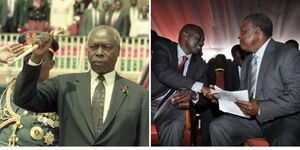The International Monetary Fund (IMF) has revealed that high debt burdens, coupled with a scarcity of cheaper options, will drive African nations, such as Kenya, to continue seeking loans.
While speaking to Bloomberg, the IMF noted that the two were the key reasons why countries on the continent continue seeking loans even as Kenya commenced talks this month over a new financing program.
Since 2020, the Washington-based lender has provided nearly $69 billion (Ksh8.9 trillion) in financing to the region and expects to continue to extend credit, an IMF spokesperson said in an emailed response to Bloomberg News.
Overall, Africa’s external debt climbed to more than $650 billion (Ksh83.9 trillion), and servicing costs reached almost $90 billion (Ksh11.6 trillion) in 2024, as per records from the United Nations.
“We are seeing continued demand from African countries for IMF support, including new programs, extensions, and augmentations, driven by persistent shocks and elevated debt pressures,” the IMF said.
The talks are taking place against the backdrop of Kenya abandoning the final disbursement of approximately $850 million (Ksh109.9 billion) from its four-year, $3.6 billion (Ksh465 billion) IMF programme after struggling to meet key targets, including reducing its budget deficit and increasing tax revenue.
In the midst of the stalemate, Nairobi has been keen on securing alternative sources of funding, including selling diaspora bonds, privatising state assets, and refinancing existing local and foreign bonds to relieve immediate pressure on the state’s finances.
Kenya, IMF and the New Loan
The Treasury is expected to send an engagement team to initiate formal talks with the IMF, as the government seeks a new loan to facilitate external debt payments, with talks between the two parties set to take place over the next two months.
As talks commence, Kenya hopes to attain a favourable loan program, perhaps on with more achievable conditions, to curtail the risk of defaulting.
However, seeking loans from global bodies such as the IMF results in a burgeoning debt, despite the country already having high levels of debt distress. Further, it brings in the risk of Kenya defaulting on its debt obligations.
Currently, Kenya has a public debt of Ksh11 trillion. Of this, Ksh5 trillion comprises domestic debt, while Ksh5.09 trillion accounts for external debt. Domestic debt largely consists of Treasury Bills and Bonds, whereas external debt is owed to multilateral, bilateral, and commercial creditors.
This, together with Kenya’s debt level standing at 63 per cent of its GDP, well below the stipulated 55 per cent, would strain Kenya’s fiscal position even further.
The knock-on effect of this would be foreign investors demanding higher risk premiums, with massive penalties for defaulting.
However, this is where the IMF comes in, as African leaders continue seeing IMF support not just as a financial backstop, but also as a strategic tool to unlock broader funding options.
Meanwhile, the new talks are still expected to be prolonged, with financial analysts noting that funds would most likely begin streaming after the 2027 General Election.
They attributed the delay to new reforms proposed by Kenya in seeking the new financing programme.
Further, they said that the IMF may require the government to repay part of its existing debt before a substantive new financing programme can be considered, with an agreement unlikely to be reached before the elections.
The most likely outcome of this would be a blow to Ruto’s budget plans, and the government’s ambition to service external debts owed.












